These Teas End Bloating Fast — Learn How to Blend Them to Boost the Benefits
Plus discover more doctor-backed tricks that nix puffiness naturally

That full, puffy feeling that hits when your belly is bloated can make your pants feel tight and leave you sluggish and irritable. But treating yourself to a cup of herbal tea for bloating can help. Fact is, people have turned to tea for bloating for centuries. “Warm beverages like herbal tea can have a soothing mechanism on your gut,” explains Wendi LeBrett, MD, a gastroenterologist based in Los Angeles.
Certain herbal sippers contain properties that help your belly de-puff by releasing pent-up gas. Warm liquids might also relax the muscles in your GI tract, which can aid digestion and further help release gas that’s making your bloated, she says. Here, find out which teas will do your gut the most good, plus more natural remedies for bloating.
Why bloating happens
Bloating occurs when excess gas gets trapped in your intestines. It’s no surprise that this can leave you feeling uncomfortably full and cause your stomach to stick out. “Normally, intestinal gas moves through our system without much trouble,” says Danielle VenHuizen, MS, RDN, a Seattle-based registered dietitian specializing in GI health and owner of Food Sense Nutrition. “But when it doesn’t, it gets trapped.” And that can make you feel bloated.
But what causes trapped gas in the first place? Sometimes, it can be a part of the aging process, says Dr. LeBrett. “Digestive motility, or the rate at which food moves through your GI tract, slows as we get older. So we see bloating in postmenopausal women particularly,” she explains. (When food moves more slowly through your GI tract, it can begin to ferment and cause gas to build up.)
Menopause-related hormone changes can factor in, too. Declines in estrogen can alter the bacteria in your gut, reveals research in the International Journal of Women’s Health. That might “allow ‘bad’ bacteria to take root and cause more unpleasant symptoms like bloating,” VenHuizen says.

Other common culprits include:
- Constipation
- Trouble digesting certain foods, like dairy, wheat or beans
- Swallowing excess air from chewing gum or drinking through a straw
- Drinking carbonated drinks like seltzer or soda
Whatever the reason behind your painful puffiness, tea for bloating can help tamp down symptoms naturally.
Tea for bloating: The 5 best brews
So which tea will give you the best benefits when it comes to bloating? Our experts recommend trying one of these delicious herbal sippers.
1. Ginger tea
“Ginger tea can be immensely helpful for bloating,” VenHuizen says. It’s been used for centuries in traditional Chinese and Ayurvedic medicine to relieve gas and indigestion, and now research reveals why. “It relaxes the muscles in your GI tract,” to help relieve gas and speed digestion, Dr. LeBrett explains.
VenHuizen recommends steeping thin slices of peeled, fresh ginger in boiling water for at least 10 minutes to make a strong, spicy tea. The long brew time will extract more of ginger’s anti-bloating compounds, so you get the biggest de-puffing bang for your buck. Prefer a bagged brew? Try Traditional Medicinals Organic Ginger Tea (Buy from Amazon, $4.92). (Click through to learn how ginger tea can ease migraine pain, too.)
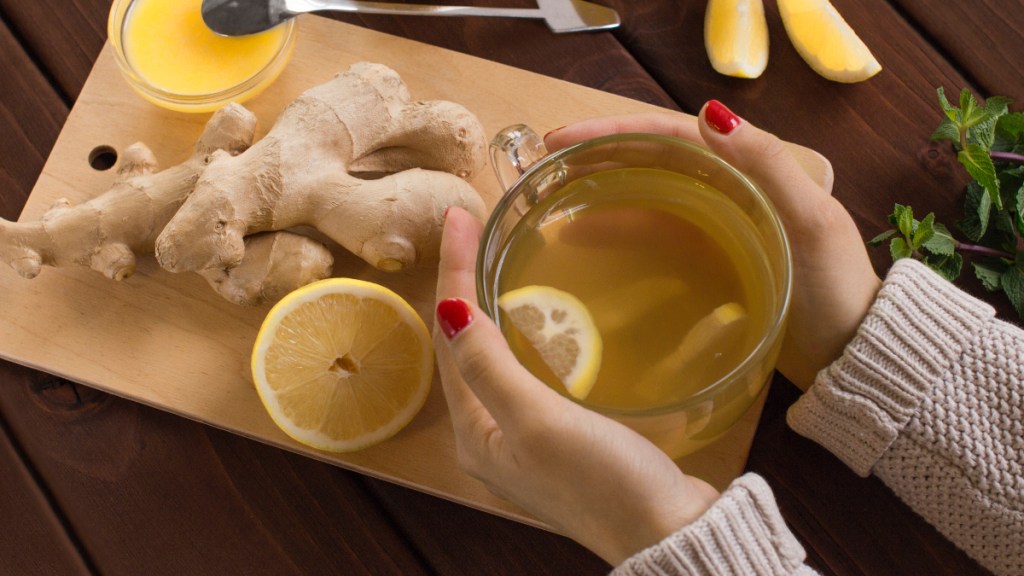
2. Peppermint tea
Peppermint has been shown to be a highly potent remedy for easing bloating and reducing abdominal pain, found a review in BMC Complementary Medicine and Therapies. And it’s one of Dr. LeBrett’s go-to recommendations for her patients. “Peppermint also has properties that relax the muscles in your GI tract,” she adds.
To make your own peppermint tea, simply add 1 to 2 tsp of chopped fresh peppermint leaves to a mug of boiling water. Then cover and steep for at least 5 minutes, VenHuizen recommends. Or try Harney and Sons Organic Peppermint Tea (Buy from Amazon, $9.89).
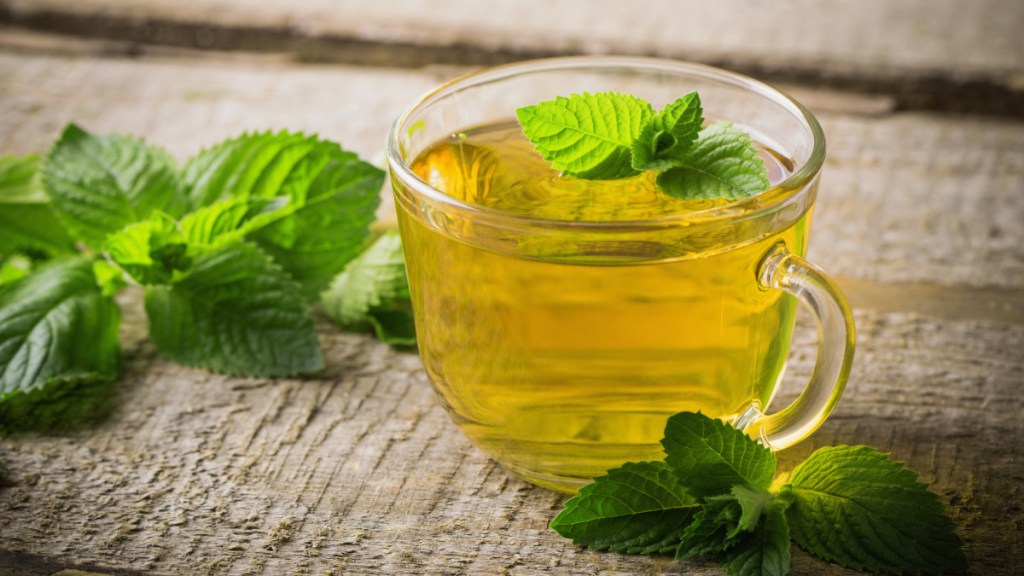
3. Fennel tea
Fennel tea, which is made from the ground seeds of fennel leaves, serves up compounds that help relax your GI tract and make it easier for trapped gas to escape, Dr. LeBrett says. It also has diuretic properties to help relieve puffiness and water retention that can happen when you eat salty meal, according to research in the International Journal of Food Properties.
You can steep a fennel tea bag in boiling water for 5 minutes to make a potent, bloat-fighting brew, VanHuizen says. Try Buddha Teas Organic Fennel Seed Tea (Buy from Amazon, $8.37). Or reach for whole fennel seeds if you have them in your spice rack. “Steep 1 tsp of whole fennel seeds in 2 cups of boiling water for 5 minutes,” VanHuizen recommends.
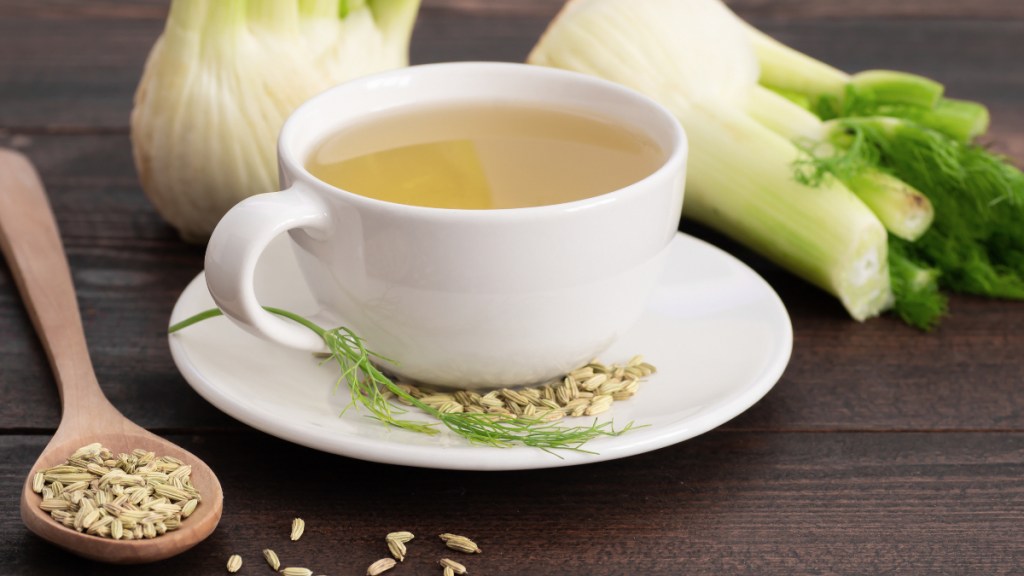
4. Chamomile tea
Chamomile’s antioxidants can fight gas, bloating and abdominal pain all at once, says Dr. LeBrett, especially when you sip it regularly. In a study in Der Pharma Chemica, reserachers found that people who drank chamomile tea daily for four weeks reduced gassiness up to 75%. You can brew chamomile tea using store-bought tea bags, steeping one in a cup of hot water for 5 minutes. Try Celestial Seasonings Chamomile Tea (Buy from Amazon, $18.72).
Note: While chamomile can help many people de-bloat, if you have irritable bowel syndrome (IBS), the herb might actually make bloating worse. “Chamomile is listed as a high FODMAP food,” VanHuizen explains. “For some people with IBS, these foods can increase gas and bloating. So back off this one if more bloating occurs as a result.” (Click through to learn the difference between IBD vs IBS, plus how to soothe GI upset.)
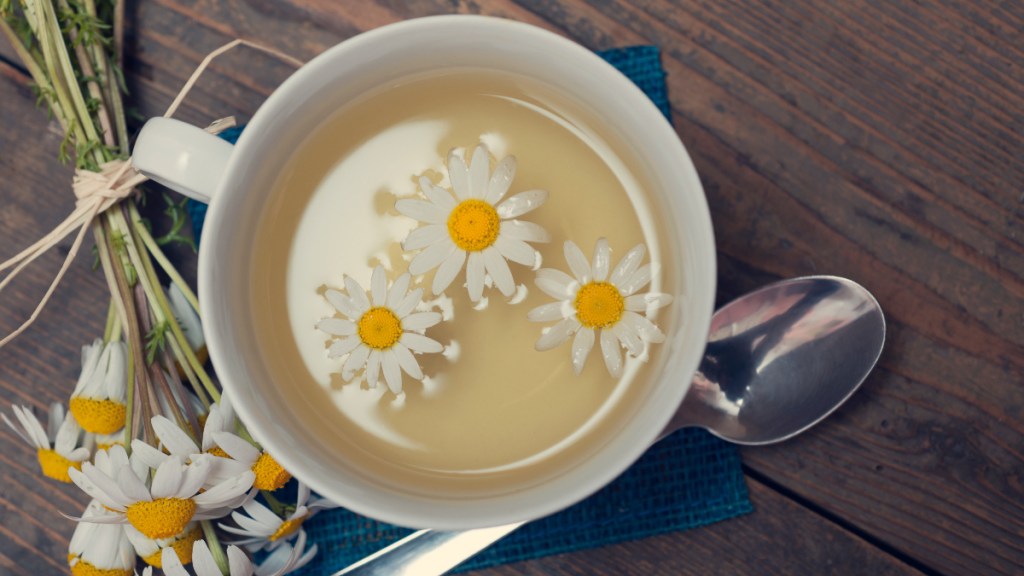
5. Dandelion tea
While dandelions may be a nuisance in your garden, the plant is surprisingly good for your gut. “Dandelion tea is thought to have diuretic and detoxifying properties, making it a reasonable choice for helping with digestion,” says VenHuizen. But since it’s less effective for releasing trapped gas, she recommends using it alongside other anti-bloating herbs (more on that below) instead of on its down. Try Buddha Teas Organic Dandelion Root Tea (Buy from Amazon, $9.23).
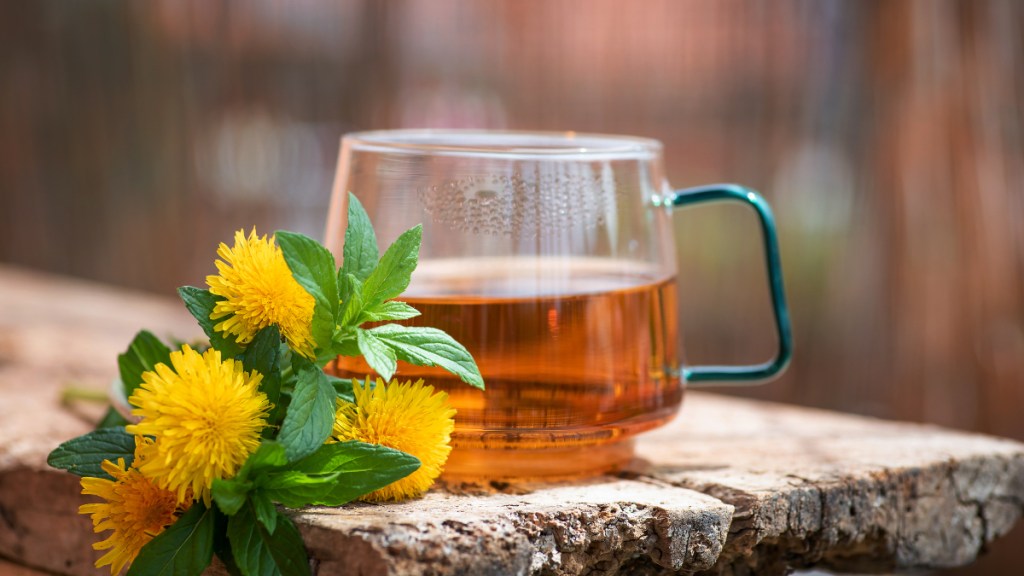
Tea blends for bloating
VenHuizen’s favorite tea for beating bloating is actually a blend of several different herbs. “I like to combine a knob of fresh ginger, a teaspoon of fennel seeds and a store-bought bag of dandelion tea,” she says. “These herbs and spices calm the intestines, soothe the digestive tract and are a powerhouse of antioxidants.” Steep the mixture in a mug of hot water for 5 to 10 minutes before drinking.
Prefer a store-bought blend? Traditional Medicinals Organic Smooth Move Tea (Buy from Amazon, $4.92) is a favorite of Dr. LeBrett’s, since it can help with bloating and relieve constipation. It’s made with ginger, fennel and licorice. Plus it contains senna, the fruit or leaf of the senna plant, which can get things moving within 6 to 12 hours.
More easy ways to beat bloating
Tea for bloating isn’t the only tool in your toolkit when you’re feeling uncomfortably puffy. These two easy tricks will also make a difference.
Take deep belly breaths
Diaphragmatic breathing, where you take slow, deep belly breaths, is the number one natural bloat-buster favored by Dr. LeBrett and VenHuizen. “While it might sound counterintuitive, filling the abdomen fully with each breath helps move the intestines, which can release trapped air,” VenHuizen says. “Plus it has the benefit of reducing stress, which is another way to help the gut get moving.”
Here’s how to do it:
- Sit comfortably while placing one hand on your chest and the other just below your ribcage.
- Inhale slowly through your nose while your belly fills with air (the hand below your ribcage should feel your stomach expanding) for five counts.
- Exhale slowly through pursed lips, tightening your stomach muscles to push out as much air as possible for five counts.
- Repeat for 5 to 10 minutes, 3 to 4 times per day.

Snack on kiwifruit
“This is one of my favorite hacks when someone is bloated from constipation,” Dr. LeBrett says. Kiwifruit contains natural compounds that help draw water into the intestines, making your stool smoother and easier to pass, she explains. In fact, eating two kiwifruit a day was found to relieve constipation just as well as an over-the-counter laxative, found a study in Nutrients.
For more of the best health-boosting brews:
Could This TikTok-Trendy Tea Be the Next Superfood? What to Know About Chaga
Fennel Tea Can Ease Bloat, Calm Stress + Boost Sleep — How to Brew It for Pennies
This content is not a substitute for professional medical advice or diagnosis. Always consult your physician before pursuing any treatment plan.














